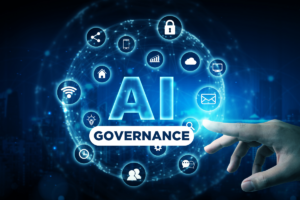In today’s rapidly evolving technological landscape, the saying “People using AI are replacing people who aren’t” has never been more pertinent. Artificial Intelligence (AI) is transforming industries, and organizations that effectively integrate AI into their operations are gaining a significant competitive edge. This shift underscores the critical need for robust AI governance and specialized advisory services to navigate this uncharted territory responsibly.
The Growing Need for AI Governance
AI is actively shaping decision-making processes, automating workflows, and enhancing productivity across various sectors. However, the power of AI comes with inherent risks, including biased algorithms, data privacy concerns, and potential misuse. Without proper governance, organizations expose themselves to regulatory penalties, reputational harm, and operational inefficiencies.
AI governance involves creating a framework of standards, rules, and regulations to guide the ethical and responsible use of AI technologies. This includes formulating and enforcing policies that shape AI’s design, deployment, and operation, ensuring alignment with ethical standards, regulatory requirements, and organizational values.
Key components of AI governance include:
- Ethical Use: Implementing AI responsibly to promote fairness, transparency, and accountability.
- Data Privacy and Security: Safeguarding sensitive information to maintain trust and comply with legal obligations.
- Transparency and Accountability: Providing clear insights into AI decision-making processes and establishing mechanisms for oversight.
The Evolving Role of Advisors
As AI adoption accelerates, businesses require more than just IT security and cloud infrastructure support—they need AI advisors who understand the nuances of AI governance and can help them navigate its complexities. AI advisors assist organizations in:
- Navigating Compliance Requirements: Ensuring AI tools align with evolving regulations like the EU AI Act and industry-specific standards.
- Mitigating AI Risks: Implementing policies to safeguard against inaccuracies and biases in AI outputs.
- Enhancing Cybersecurity Posture: Establishing stringent data privacy and security measures for AI systems handling sensitive data.
- Driving Responsible AI Adoption: Balancing innovation with ethical considerations to harness AI’s potential without unintended consequences.
How MSPs Can Implement AI Governance for Clients
Managed Service Providers (MSPs) have a critical opportunity to position themselves as leaders in AI governance. By offering AI training and policy management services, they can ensure their clients use AI responsibly and securely.
Leveraging tools like ClipTrainings Policy Management Tool allows MSPs to streamline AI governance implementation by:
- Mass Policy Rollouts: Efficiently distributing AI governance policies across client organizations.
- Automated Compliance Tracking: Monitoring policy acknowledgment and adherence, with real-time updates on compliance status.
- Reminder Automation: Sending notifications to users who have not yet signed their assigned policies, ensuring full participation.
- Centralized Documentation: Maintaining secure, auditable records of all policy acknowledgments for regulatory compliance.
- Streamlined Updates: Simplify the process of communicating policy changes, reducing the risk of non-compliance due to outdated information.
By integrating AI governance policies through automated tools, MSPs help clients reduce risk, improve compliance, and foster trust in AI-driven initiatives.
Providing a Sample AI Governance Policy
To support organizations in implementing effective AI governance, we have provided a sample AI Governance Policy meant to serve as a foundation for clients to customize according to their specific needs. This ensures that all employees understand their responsibilities regarding AI usage and contributes to a culture of ethical AI adoption.
Conclusion
The integration of AI into business operations is not merely a technological upgrade but a strategic necessity. Organizations that proactively adopt AI, underpinned by strong governance and expert guidance, position themselves for sustained success. Conversely, those who resist this shift may find themselves outpaced by competitors who effectively leverage AI’s capabilities. Embracing AI with a structured approach ensures that technology serves as an enabler of human potential, rather than a replacement.
Discover how ClipTraining empowers Managed Service Providers (MSPs) to become trusted AI Advisors. Book a Demo today!
